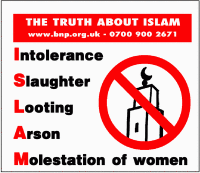The Muslim Council of Britain calls on the House of Lords to reject the amendments proposed today by those opposed to the Racial and Religious Hatred Bill.
“These proposed amendments will allow the current unfair situation whereby we have a hierarchy of rights for members of different faith groups to continue. The amendments – if accepted – will mean that British Muslims will continue to remain second-class citizens and denied the same level of legal protection that is given to some racial and religious groups including Jews and Sikhs under existing racial incitement laws,” said Sir Iqbal Sacranie, Secretary-General of the Muslim Council of Britain.
The MCB believes that some opponents of the Racial and Religious Hatred Bill have been engaged in a campaign to misrepresent its purpose and have misleadingly claimed that it will prevent criticism or ridicule of religion. This is demonstrably untrue as will be clear to anyone who has read the actual wording of the Bill.
“The opponents of the Racial and Religious Hatred Bill have yet to provide a credible answer as to why we can trust our judicial system to be able to make a distinction between criticism of the Jewish and Sikh religions and incitement to hatred against Jews and Sikhs, while not being able to do the same in the case of other faith groups, including Muslims,” added Sir Iqbal.
Without the proposed extension of the existing incitement law, Muslims and other faith groups remain unprotected, since they do not fall into a single racial group. The purpose of the proposed law is to protect people belonging to a particular faith identity and not the faith itself. Existing incitement laws in England and Wales and Northern Ireland have proved that it is possible to give protection to people without infringing on the right to free speech and the right to criticize religious beliefs.

 “… in May 2004, following the receipt of complaints from members of the public, the CRE wrote to the West Yorkshire Police Constabulary to ask that it investigate the distribution of a BNP leaflet, ‘The Truth About Islam: Intolerance, Slaughter, Looting, Arson, Molestation of Women’, in Dewsbury where there is a sizeable Pakistani community, locally referred to as ‘the Muslims’.
“… in May 2004, following the receipt of complaints from members of the public, the CRE wrote to the West Yorkshire Police Constabulary to ask that it investigate the distribution of a BNP leaflet, ‘The Truth About Islam: Intolerance, Slaughter, Looting, Arson, Molestation of Women’, in Dewsbury where there is a sizeable Pakistani community, locally referred to as ‘the Muslims’. Rowan Atkinson made the least funny speech of his career yesterday when he went to warn the House of Lords of the threat to free speech from a law banning religious hatred.
Rowan Atkinson made the least funny speech of his career yesterday when he went to warn the House of Lords of the threat to free speech from a law banning religious hatred. Muslims and members of other religions should get used to being mocked, the former Archbishop of Canterbury said yesterday. Lord Carey of Clifton said he passionately believed it was good for members of a religion to have their faith criticised on certain occasions.
Muslims and members of other religions should get used to being mocked, the former Archbishop of Canterbury said yesterday. Lord Carey of Clifton said he passionately believed it was good for members of a religion to have their faith criticised on certain occasions.